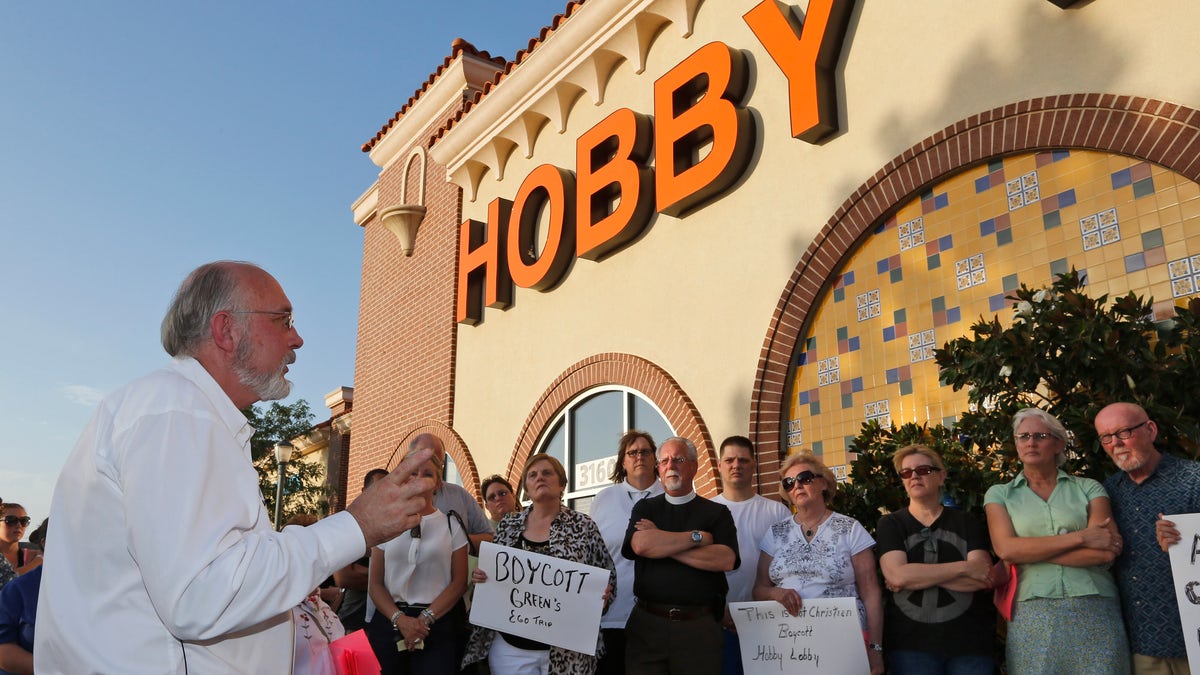
Rev. Bruce Prescott, left, speaks during a vigil outside a Hobby Lobby store in Edmond, Okla., Monday, June 30, 2014. (ap)
Should you care about your employer’s religion? As of Monday, the answer is Yes. In Burwell v. Hobby Lobby, the Supreme Court ruled that certain corporations do not have to provide insurance coverage for contraception to their employees. Writing for the 5-4 majority, Justice Samuel A. Alito Jr. said that the law allowed “closely-held” corporations to exercise their religious principles and not provide birth control.
Under the Affordable Care Act, corporations are required to provide contraceptive coverage to employees. But the owners of Hobby Lobby, a national chain of craft stores, believe that this requirement infringed on their Christian values. So they sued, and the Court ruled in their favor on Monday.
Unfortunately, the Court’s decision is deeply flawed. It runs against the basic principles of business, and holds the potential to negatively impact the lives of Latinas. Not only are Hobby Lobby’s claims about their religious principles suspect, this decision could have the unintended consequence of actually increasing abortions.
In arguing that their beliefs would be violated if they have to provide birth control to their employees, Hobby Lobby’s owners were literally seeking to have things both ways. They wanted the legal benefits of a corporation and the freedom-of-religion rights of a person.
To be clear, this was not a case about churches or religious institutions; they are exempt from the contraception mandate. Hobby Lobby is a for-profit corporation with 13,000 employees and 572 stores. As a corporation, the owners of Hobby Lobby receive tax breaks, bankruptcy protection, and are shielded from personal liability. In arguing that their beliefs would be violated if they have to provide birth control to their employees, Hobby Lobby’s owners were literally seeking to have things both ways. They wanted the legal benefits of a corporation and the freedom-of-religion rights of a person.
Surprisingly, the Court agreed with them, a position at odds with one of the fundamental principles of American business law. A corporation is a shield, a legal fiction created for the purposes of commerce. The Hobby Lobby decision could create all sorts of confusion and uncertainty in business law. No wonder that not a single Fortune 500 company filed a “friend of the court” brief on behalf of Hobby Lobby.
The Hobby Lobby decision is bad news for Latinas. That’s why the League of United Latin American Citizens (LULAC), Mexican American Legal and Educational Defense Fund (MALDEF), the Hispanic Federation and 20 other Hispanic advocacy organizations signed a letter affirming their support for access to contraceptive coverage. They recognize that this ruling will make it harder for Latinas to access the health coverage that they need, especially since research shows that 57 percent of Latinas have struggled with the cost of prescription birth control. The Court’s decision also runs counter to what most Hispanics believe. Latino Decisions reports that vast majority of Latinos agree that women should have easy access to contraception, including over 60 percent of Latino conservatives, Catholics, and Born-Again Christians.
Hobby Lobby won their case because a majority of the Court decided to respect the owners’ “sincerely-held religious beliefs.” Indeed, on the company website, it states that Hobby Lobby is committed to “Honoring the Lord in all we do by operating the company in a manner consistent with biblical principles.” However, Hobby Lobby sells thousands of products made in China, which has a known history of child labor, forced sterilizations, mandatory abortions, and a ”one-child only” family policy. The company’s retirement plan invests in many companies that manufacture birth control devices, and their insurance plan even covered birth control in the past. It seems hypocritical that the company can selectively choose when it wants to conduct business in a manner consistent with “biblical principles.”
The great danger of not allowing women to access contraceptive coverage is that we could end up with more unwanted pregnancies – which could lead to more abortions.
Besides, with all of the debate about the religious beliefs of the Hobby Lobby owners, what about the religious beliefs of their employees? They are just as important, and should not be trampled upon.
In her dissent, Justice Ruth Bader Ginsburg writes, "The exemption sought by Hobby Lobby would … deny legions of women who do not hold their employers' beliefs access to contraceptive coverage.” She calls the ruling “radical” and wrote that it will create “havoc.”
She’s right. She wonders whether the Court’s decision could be extrapolated to employers refusing to cover blood transfusions (if company owners are Jehovah’s Witnesses), antidepressants (Scientologists), or medications derived from pigs, including anesthesia (Muslims). Although the majority opinion insists that these scenarios will never occur, it never explains why not. So the high court has opened a dangerous door.
With Hobby Lobby, the Supreme Court made a disastrous mistake. All people deserve their full freedom of religion rights – not just the boss.
